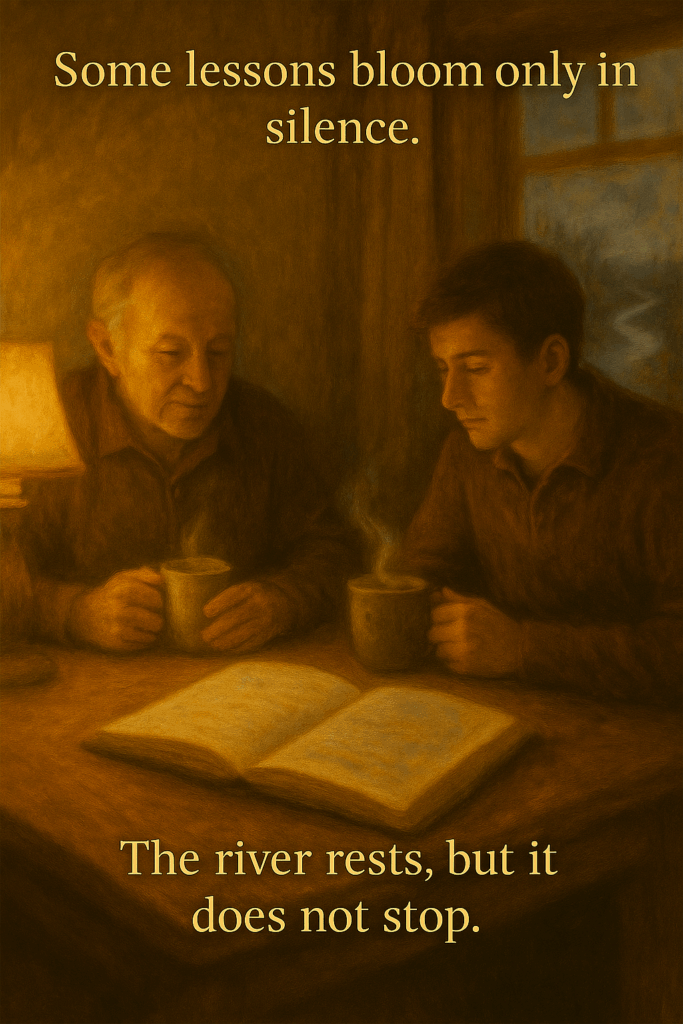
The plane landed at dusk, the sky over Crestview blushing between copper and cloud.
By the time Emil reached Grandfather’s house, twilight had settled into the corners like old music — the kind you don’t need to play to hear.
The snow had melted into streams that threaded through the garden. Moss covered the stones that once lined the path to the greenhouse. The air carried that clean, almost translucent scent of early spring — earth remembering how to breathe.
Inside, the same kettle sang its slow familiar song. Grandfather sat by the window, a knitted shawl draped over his shoulders, the light pooling softly around him like a confession. The ledger lay on the table between them, thicker now — its spine bowed, its edges smudged with ash and color.
Neither spoke at first. Silence filled the room like the last light after a storm.
Finally, Grandfather smiled.
“You’ve brought it home,” he said, nodding at the ledger.
Emil nodded. “It’s heavier than when it left.”
“That means it listened.”
They poured tea — steam rising like invisible handwriting. Outside, the stream hummed faintly under the bridge of thawed roots.
Emil ran his hand along the ledger’s edge. “It feels strange to be back. In Kyiv, silence meant something fragile. Here, it feels whole again.”
Grandfather’s eyes warmed with recognition.
“Silence doesn’t change, Emil. Only our need for it does. In one place, silence hides what hurts. In another, it heals what’s ready.”
Emil leaned back, letting the warmth of the tea seep into his palms. “They finished the mural after we left. Sofia said they added a bridge where our river ended.”
“A good choice,” Grandfather said softly. “But tell me — what holds a bridge up?”
Emil hesitated. “The pillars, I suppose.”
Grandfather tapped the table gently. “No — the space between them. That’s where flow hides. A bridge without emptiness cannot stand. Peace works the same way.”
He continued, “Peace is not the erasure of difference, but the space that allows difference to breathe without becoming a battlefield. Its strength is not in what we construct, but in what we keep open — so that our differences become opportunities for justice, and for every good that can grow from it.”
Outside, a gust swept through the yard, shaking droplets from the bare branches. Each drop caught the lamplight before it fell, like momentary truth.
Emil smiled faintly. “I thought we went there to teach. But I think we were the ones being taught.”
Grandfather chuckled, his voice a low vibration of tenderness. “The garden always teaches the gardener first. You plant to change the soil — and the soil changes you instead.”
They sat in quiet again, watching the small stream slide under the window’s reflection.
After a while, Emil said, “The UN wrote back. They want us to speak… about how art can mend borders.”
Grandfather’s gaze lingered on him — not with surprise, but with the serenity of inevitability.
“Then tell them what the river told you.”
Emil raised an eyebrow. “And what’s that?”
“Peace is not built by agreement,” Grandfather said. “It is built by attention. Borders may remain on maps, but they can open like bridges — shared like the Union of nations that choose cooperation over division — when people remember how to listen.”
The words hung between them, simple as a truth too long forgotten.
Emil looked down at the ledger again — the same pages that had once trembled under candlelight in Kyiv. “Do you think it’s enough, Grandfather? What we did there?”
Grandfather reached across the table and placed his weathered hand over Emil’s. “Enough is not measured by what you finish, but by what you leave able to continue.”
The kettle sighed. The stream outside quickened with the night’s melt. Somewhere in that sound — the soft hum between movement and rest — Emil heard the river again.
He opened the ledger to its final blank page. The faint scent of paint and winter dust rose like memory.
He picked up his pen, paused, then wrote in small, careful strokes:
Ledger Note — Return
Date: April 28, 2026
Condition: The flow has returned to its source.
Observation: The river teaches patience; the bridge teaches humility.
Note: When peace returns home, it does not ask what it achieved — only what it nourished.
He closed the book gently, as one might close a prayer.
Grandfather Tomas smiled. “You’ve listened well, my boy.”
Emil looked toward the stream beyond the window — silver under the moonlight, a single thread connecting all he had seen and left behind.
And for the first time, the silence between them didn’t feel like an ending.
It felt like flow — still moving, still remembering.

